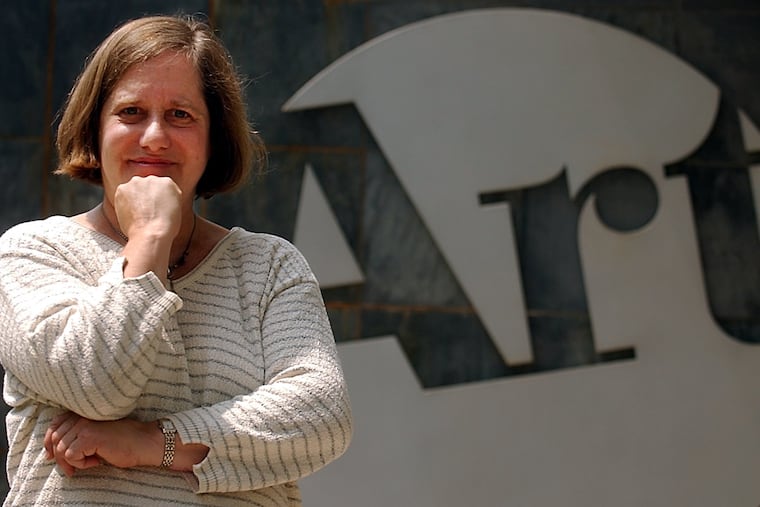Judy Herman, retired longtime director of the Main Line Art Center, has died at 75
She advocated tirelessly for artists and students, and said in 2001: “Art is a wonderful way to deal with anxiety, memories, the pressures of the world.”

Judy Herman, 75, of Bala Cynwyd, retired longtime director of the Main Line Art Center, former museum program coordinator, schoolteacher, and volunteer, died Wednesday, March 13, of respiratory failure at Lankenau Medical Center.
Ms. Herman served as director of the Main Line Art Center from 1988 to 2012 and is credited by administrative colleagues, artists, students, and visitors with transforming the promising but underdeveloped art complex into a thriving community treasure. “She’s a dynamo,” Paula Marincola, the current executive director at the Pew Center for Arts & Heritage, told The Inquirer in a 2003 profile of Ms. Herman. “She is a model for what a community arts organization director can achieve in terms of level of programming and the visibility of the organization.”
During her 25-year tenure at the center’s mini-mansion in Haverford, known locally as the “white house,” Ms. Herman saw the organization’s operating budget grow from $100,000 in 1989 to $1.3 million in 2012. The support staff expanded from one person to 10, and officials in 2012 estimated that more than 15,000 artists, students, and visitors had participated in center events that year.
She oversaw a multimillion-dollar expansion and renovation of the center in 1999 that added new photography and printmaking studios to a curriculum already packed with tuition-free classes on painting, drawing, sculpture, ceramics, jewelry-making, papermaking, woodworking, quilting, and other disciplines. Artistic creation, she said often, is an essential thread in the human fabric.
“You have to look at art for its intrinsic value to the individual and the community, and realize it enriches and brings balance,” Ms. Herman told The Inquirer in 2003. “With all of the things happening in the world, it’s really important to balance our lives with art. Art should be accessible to everyone.”
She worked at the Boston Museum of Contemporary Art and the National Zoo in Washington, and as an elementary schoolteacher before joining the Franklin Institute and Please Touch Museum in Philadelphia in the early 1980s. She built on those experiences at the art center to design innovative outreach programs, workshops, enrichment classes, and a lecture series that extended the center’s influence far beyond the Main Line.
She enhanced exhibits for local artists, improved programs for people with special needs, and funded scholarships for art students. The center even sponsored the Art Alive mobile van that visited schools and libraries to share pieces from its collection.
She was a dynamic fundraiser and secured grants from the Pew Charitable Trusts, National Endowment for the Arts, and other organizations that financed notable exhibits such as “Points of Departure: Art on the Line,” “Art Unleashed,” and “Past Presence: Contemporary Reflections on the Main Line.” She was quoted often in The Inquirer, and colleagues in 2003 called her “a visionary” and “incredibly energetic and determined.”
She was named a 1998 Woman of Achievement by the Freedom Valley Girl Scout Council, won a 2003 Arts Management Excellence Award from the Arts and Business Council of Greater Philadelphia, and earned a 2005 Artists Equity Award for “outstanding dedication to the arts and artists.”
After her retirement, she transferred much of her energy to social service by, among other things, assisting local refugees through the Intergenerational Center at Temple University and Hebrew Immigrant Aid Society. She also mentored a high school student in the Philadelphia Futures program to become the first in her family to attend college.
“She was always there to help,” said her husband, Stephen Small. “She was there to care for people.”
Judy Ann Snellenburg was born Dec. 16, 1948, in Abington. She became enamored with arts and crafts at a summer camp in Maine, and excelled in art classes later at Abington High School.
She earned a bachelor’s degree in art history at Smith College in Massachusetts and a master’s degree in art education at George Washington University in Washington.
She married William Herman and they had sons Steven and Andrew, moved to Philadelphia in the early 1980s, and lived in Bala Cynwyd. They divorced later, and she married Stephen Small in 2013, and welcomed his children and grandchildren into her life.
Ms. Herman intensified her own painting and took classes after her retirement. She served as a docent at the Barnes Foundation, and she and her husband played bridge, went on movie dates, and traveled to four continents.
She especially liked spending time in Cape May and Eagles Mere, near Scranton. Of course, she visited museums and chatted up the art community wherever she went. “She never got away from it totally,” her husband said.
She was active at her synagogue and liked to play and read with all the grandchildren. “I feel so lucky to have known her,” a friend said in an online tribute.
Her son Steven said: “She never met a stranger. She wanted to get to know people.” Her son Andrew said: “She was authentic and not afraid to be outgoing. She cared deeply about helping others.”
In addition to her sons, husband, and grandchildren, Ms. Herman is survived by a sister and other relatives. Her former husband died earlier.
Services were held on March 17.
Donations in her name may be made to the Main Line Art Center, 746 Panmure Rd., Haverford, Pa. 19041.